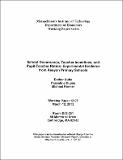School Governance, Teacher Incentives, and Pupil-Teacher Ratios: Experimental Evidence from Kenyan Primary Schools
Author(s)
Duflo, Esther; Dupas, Pascaline; Kremer, Michael
DownloadDuflo12-07.pdf (342.2Kb)
Terms of use
Metadata
Show full item recordAbstract
We examine a program that enabled Parent-Teacher Associations (PTAs) in Kenya to hire novice teachers on short-term contracts, reducing class sizes in grade one from 82 to 44 on average. PTA teachers earned approximately one-quarter as much as teachers operating under central government civil-service institutions but were absent one day per week less and their students learned more. In the weak institutional environment we study, civil-service teachers responded to the program along two margins: first, they reduced their effort in response to the drop in the pupil-teacher ratio, and second, they influenced PTA committees to hire their relatives. Both effects reduced the educational impact of the program. A governance program that empowered parents within PTAs mitigated both effects. Better performing contract teachers are more likely to transition into civil-service positions and we estimate large potential dynamic benefits of contract teacher programs on the teacher workforce.
Date issued
2012-03-12Publisher
Cambridge, MA: Department of Economics, Massachusetts Institute of Technology
Series/Report no.
Working paper, Massachusetts Institute of Technology, Dept. of Economics;12-07
Keywords
contract teachers, PTA, School-Based Management, teacher effort, test score gain, nepotism, corruption, decentralization, institutions
Collections
The following license files are associated with this item: